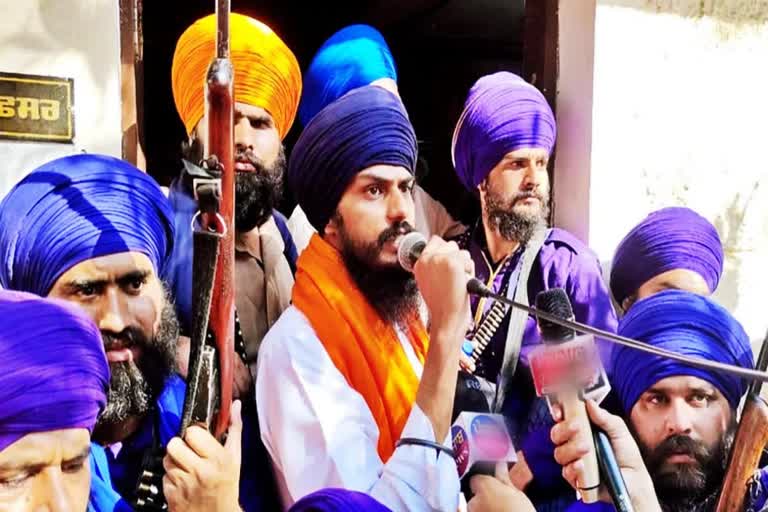Hyderabad:Crackdown on Amritpal Singh, a self-styled Sikh preacher and pro-Khalistan fiery propagator, might not be the end of an episode, but it can be the beginning of long forgotten era of Punjab. Singh, who claims himself to be a follower of Jarnail Singh Bhindranwale, a militant Sikh separatist leader, who was killed during Operation Blue Star in 1984, might unleash the spate of terrorism and lawlessness in the bordering state of the country.
Amritpal Singh's early life is largely unknown, but he is from Jallupur Khera in Punjab's Amritsar district. He moved to Dubai in 2012 to join his family's transport business after earning a mechanical engineering degree from a university in Punjab. Singh's LinkedIn profile indicates that he worked as an "operational manager" at a cargo company.
For years, Singh was primarily popular on social media, where his views on Sikh unity and statehood resonated with many. In August of the previous year, he travelled from Dubai to India, looking markedly different from older photos in which his hair and beard were neatly trimmed. He now appeared to be a devout, practising Sikh, with unshorn hair tucked into a blue turban, a long, flowing beard, a steel bangle on his wrist, and a small sacred dagger called a kirpan hanging from his waist.
Singh was appointed the leader of Waris Punjab De (Heirs of Punjab) a month later, an organisation created by actor and activist Deep Sidhu, who was arrested in connection with violence during a farmers' protest and died in a car accident the same year. The ceremony was held in Rode, the ancestral village of Bhindranwale, and was attended by thousands of people.
Singh’s meteoric rise and his gaining of popularity become a cause for concern for the administration. Singh's supporters often compare him to Bhindranwale, a controversial figure in Sikh history, whom Singh calls an "inspiration". Singh's hardline views emulate Bhindranwale, as he openly calls for a separate state for Sikhs, claiming it to be the only "permanent solution" to Punjab's problems, including water disputes, drug addiction and the erosion of Punjabi culture.
Singh led a month-long religious procession across the state in November, encouraging Sikhs to become baptised and to stop drug consumption and customs such as dowry and caste-based discrimination. However, his followers made headlines a month later for destroying furniture at a Gurdwara after Singh said that people should only be seated on the floor in the presence of the Guru Granth Sahib.
Singh's sudden rise in popularity has raised concerns about the state's violent history. Decades after the bloodshed, Punjab has mostly returned to normalcy, but some fear that it may see turbulent times again. A former senior Punjab police officer, who joined the force in the 1980s, said he had seen many attacks on police stations in the past, but this is the first time that the police have been seen so helpless. Singh's travels in Punjab carrying swords and guns for the past few months without a case being filed against him has also raised concerns.
Presently, police registered three cases against Singh, two of which are related to hate speech. In February, supporters of Singh, armed with swords and arms, clashed with the Ajnala police and forcefully seized Lovepreet Singh alias Toofan, an accused in a kidnapping case, demanding his release. The protests resulted in six policemen being injured.
